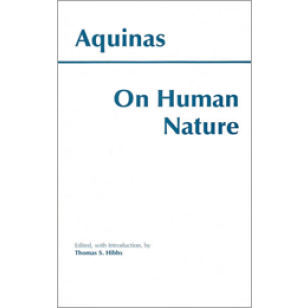On Human Nature
“The substantial Introduction and the selection have been done . . . extremely well. The Introduction makes illuminating connections between the thought of Aquinas and Descartes. . . . The book’s usefulness is enhanced by the bibliography.”
—Ian Markham, Theological Book Review
This volume begins with excerpts from Aquinas’ commentary on De Anima, excerpts that proceed from a general consideration of soul as common to all living things to a consideration of the animal soul and, finally, to what is peculiar to the human soul. These are followed by the Treatise on Man, Aquinas’ most famous discussion of human nature, but one whose organization is dictated by theological concerns and whose philosophical importance is thus best appreciated when seen as presented here: within the historical philosophical framework of which it constitutes a development. Aquinas’ discussions of the will and the passions follow, providing fruitful points of comparison with other philosophers.
Reviews:
“The substantial Introduction and the selection have been done . . . extremely well. The Introduction makes illuminating connections between the thought of Aquinas and Descartes. . . . The book’s usefulness is enhanced by the bibliography.”
—Ian Markham, Theological Book Review
Contents:
Introduction.
1. The Importance of the Study of the Soul and Its Method. Aristotle’s De Anima: bk. I, ch 1; Aquinas’s Commentary on De Anima: Lecture 1; Aristotle’s De Anima: bk. I, ch 1, Cont.; Aquinas’s Commentary on De Anima: Lecture 2.
2. Defining Soul. Aristotle’s De Anima: bk. II, ch. 1; Aquinas’s Commentary on De Anima: Lecture 1; Aristotle’s De Anima: bk. II, ch. 1, Cont.; Aquinas’s Commentary on De Anima: Lecture 2; Aristotle’s De Anima: bk. II, ch. 2; Aquinas’s Commentary on De Anima: Lecture 3.
3. The Nature of the Intellect, its Activity, and Its Separability. Aristotle’s De Anima: bk. III, ch. 4; Aquinas’s Commentary on De Anima: Lecture 7; Aristotle’s De Anima: bk. III, ch. 4, Cont.; Aquinas’s Commentary on De Anima: Lecture 8; Aristotle’s De Anima: bk. III, ch. 4, Cont.; Aquinas’s Commentary on De Anima: Lecture 9; Aristotle’s De Anima: bk. III, ch. 5; Aquinas’s Commentary on De Anima: Lecture 10.
4. Soul and Body. Summa Theologica, Part One, Q. 75, The Essence of the Soul; Q. 76, Union of Body and Soul, Art. 1-5; Q. 91, Production of Man’s Body, Art. 3.
5. The Powers of the Soul. Summa Theologica, Part One, Q. 77, Powers of the Soul, Art. 1-4; Q. 78, The Soul’s Specific Powers.
6. The Intellect: Its Knowledge of Material Things, Self-Knowledge, and Knowledge of God. Summa Theologica, Part One, Q. 79, The Intellectual Powers, Art. 1-6; Q 84, Knowledge of Bodies; Q. 85, How the Soul Knows, Art. 1-6; Q. 87, How the Soul Knows Itself; Q. 88, The Soul and What is Above It; Q. 89, Separate Soul’s Knowledge, Art. 1.
7. Human Agency: The Will and Free Choice. Summa Theologica, Part One, Q. 82, The Will; Q. 83, Free Choice; First Part of Part Two, Q. 8, Will in Regard to What It Wills; Q. 9, That Which Moves the Will; Q. 10, The Will Is Moved.
8. The Passions of the Soul. Summa Theologica, Part One, Q. 80, The Appetitive Powers; Q. 81, The Power of Sensuality; First Part of Part Two, Q. 22, Subject of the Soul’s Passions; Q. 23 How the Passions Differ; Q. 24, Good and Evil in Passions; Q. 25, Order of the Passions.
Works Cited. Bibliography. Bibliography for Works Cited. Bibliography for Aquinas On Human Nature.
About the Author:
Thomas Hibbs is Associate Professor of Philosophy, Boston College.




